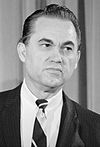
James Elisha Folsom Jr. is an American politician who was the 50th Governor of Alabama from April 22, 1993 to January 16, 1995. He has also served as Lieutenant Governor of Alabama on two separate occasions. He is a member of the Democratic Party.
George Corley Wallace III, generally known as George Wallace Jr., is an American politician from the U.S. state of Alabama.
The Alabama Democratic Party is the affiliate of the Democratic Party in the state of Alabama. It is chaired by Nancy Worley.
Emory McCord Folmar was the mayor of Montgomery, Alabama, from 1977 to 1999. Although the mayor's office is nonpartisan, Folmar was known to be a Republican.

The Alabama gubernatorial election of 1998 was held on 3 November 1998 to select the Governor of Alabama. The election saw incumbent Governor Fob James (R) against Lieutenant Governor Don Siegelman (D). The result saw Don Siegelman win a decisive victory over Fob James. As of 2019, this is the most recent election in which a Democrat was elected Governor of Alabama.

The 1994 Alabama gubernatorial election was held on 8 November 1994 to select the governor of the state of Alabama. The election saw Republican Fob James defeat Democratic incumbent Governor Jim Folsom Jr. in an upset.

The Alabama gubernatorial election of 1970 was marked by a competitive Democratic primary battle between incumbent moderate Governor Albert Brewer and segregationist former Governor and 1968 independent presidential candidate George Wallace. The Alabama Constitution was amended in 1968, allowing a governor to serve two consecutive terms.

The Alabama gubernatorial election of 1958 was held on November 3, 1958. Incumbent Democrat Jim Folsom was term limited and could not seek a second consecutive term.
Joseph Charles McCorquodale, Jr. was a United States politician from Alabama, who served as the Speaker of the Alabama House of Representatives and unsuccessfully ran for Governor on the basis of the "McCorquodale plan" for Alabama. He was a member of Democratic Party. He was born in Mobile, Alabama.

The Arkansas gubernatorial election of November 8, 1966 was the first time since Reconstruction that a member of the Republican Party was elected governor.
The National Democratic Party of Alabama (NDPA) was a political party active in the U.S. state of Alabama that opposed the segregationist former governor George Wallace.

The 1986 Alabama gubernatorial election saw the election of Republican H. Guy Hunt over Democrat Bill Baxley. In state politics, this election is largely seen as a realigning election since Hunt was the first Republican to be elected Governor since Reconstruction. In March 1986, incumbent George Wallace announced that he would not seek a fifth term as governor, ending an era in Alabama politics.

Electoral history of George Wallace, 48th Governor of Alabama, 1968 American Independent Party Presidential nominee and candidate for 1964, 1972 and 1976 Democratic Party presidential nomination

The 1962 Alabama gubernatorial election took place on November 6, 1962. Incumbent Democrat John Malcolm Patterson was term limited and could not seek a second consecutive term.

The 1978 Alabama gubernatorial election took place on November 7, 1978, to elect the Governor of Alabama. Incumbent Democratic Governor George Wallace did not run for re-election. Fob James, a businessman who had switched from the Republican Party to the Democratic Party and campaigned as a "born-again Democrat", won the Democratic primary in an upset over Attorney General Bill Baxley. He went on to defeat Guy Hunt in a landslide in the general election. Incumbent Democrat George Wallace was term limited and could not seek a third consecutive term.

The Alabama gubernatorial election of 1966 took place on November 8, 1966, and saw the election of Lurleen Wallace as Governor over U.S. Representative James D. Martin. Incumbent Democrat George Wallace was term limited and could not seek a second consecutive term.

In the United States presidential election of 1948, Alabama was the only state in which the National Democratic Party candidate, incumbent president Harry S. Truman, did not appear on the ballot. The state Supreme Court ruled that any statute requiring party presidential electors to vote for that party's national nominee was void. A "Loyalist" group did petition governor "Big Jim" Folsom to allow Truman electors, but Senator John Sparkman, fearing popular defeat at the hands of the Dixiecrats and a hostile state legislature, decided against placing Truman electors on the ballot.


















